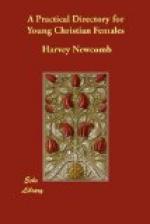2. Charity believeth all things, hopeth all things. This is the opposite of jealousy and suspicion. It is a readiness to believe everything in favor of others; and even when appearances are very strong against them, still to hope for the best. This disposition will lead us to look at the characters of others in their most favorable light; to give full weight to every good quality, and full credit for every praiseworthy action; while every palliating circumstance is viewed in connection with deficiencies and misconduct. Charity will never attribute an action to improper motives or a bad design, when it can account for it in any other way; and, especially, it will not be quick to charge hypocrisy and insincerity upon those who seem to be acting correctly. It will give credit to the professions of others, unless obviously contradicted by their conduct. It does not, indeed, forbid prudence and caution—“The simple believeth every word; but the prudent man looketh well to his going”—but it is accustomed to repose confidence in others, and it will not be continually watching for evil.
A charitable spirit is opposed to the prevailing disposition for discussing private character. It will not willingly listen to criticisms upon the characters of others, nor the detail of their errors and imperfections; and it will turn away with disgust and horror from petty scandal and evil-speaking, as offensive to benevolent feeling. It is a kind of moral sense, which recoils from detraction and backbiting.
3. Charity endureth all things. This is nearly synonymous with long-suffering; and yet it is a more extensive expression. It will endure with patience, and suffer without anger or bitterness of feeling, everything in social life which is calculated to try our tempers, and exhaust our patience. It is not testy, and impatient at the least opposition, or the slightest provocation; but endures the infirmities, the unreasonableness, the ill-humor, and the hard language of others, with a meek and quiet spirit.
Finally, charity is the practical application of the golden rule of our Saviour, and the second table of the law, to all our intercourse with our fellow-men, diffusing around us a spirit of kindness and benevolent feeling. It comprehends all that is candid and generous, bland and gentle, amiable and kind, in the human character, regenerated by the grace of God. It is opposed to all that is uncandid and disingenuous, coarse and harsh, unkind, severe, and bitter, in the disposition of fallen humanity. It is the bond, which holds society together, the charm which sweetens social intercourse, and the UNIVERSAL PANACEA, which, if it cannot cure, will at least mitigate, all the diseases of the social state. That you may possess it in its highest earthly perfection, is the sincere prayer of
Your affectionate Brother.




